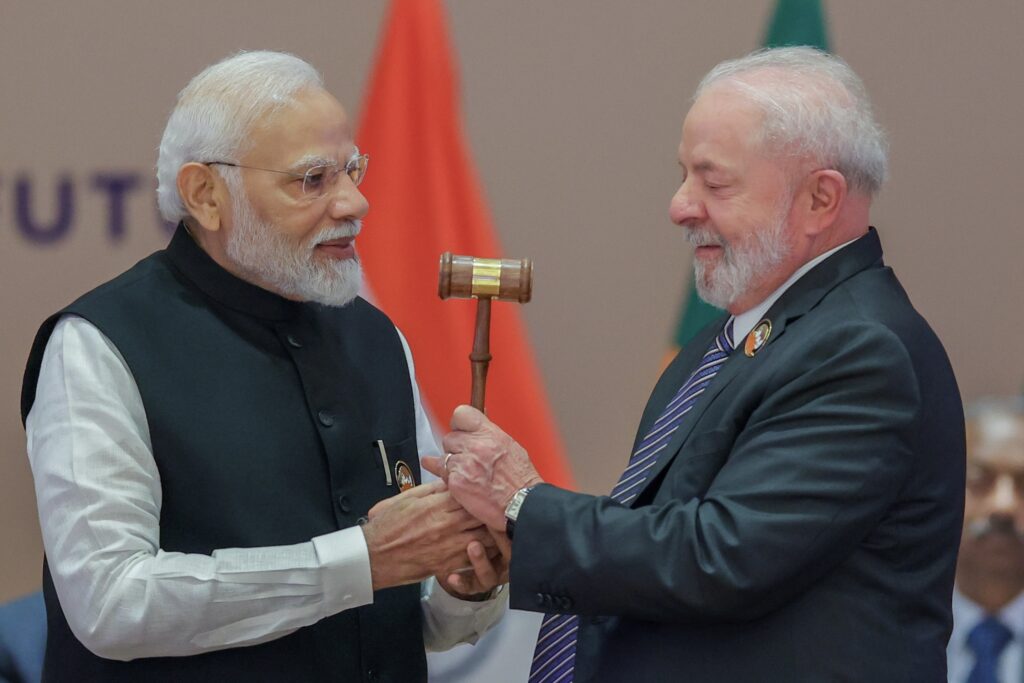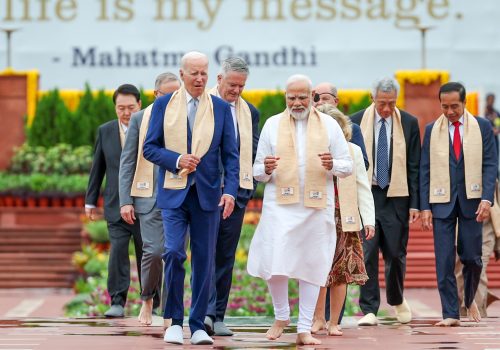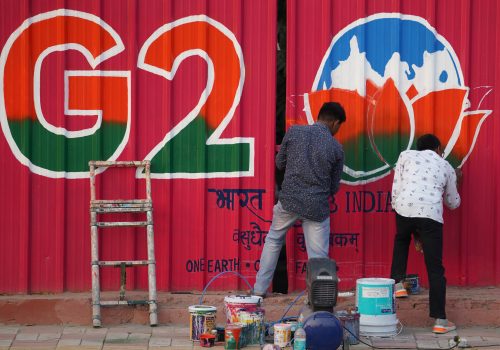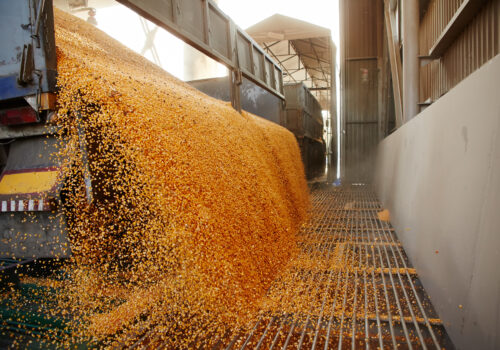In 2009, the telenovela Caminho das Índias won Brazil’s first International Emmy award. The hit show depicted Indian and Brazilian characters coming to terms with social and economic upheaval in the rapidly modernizing countries in the 1990s and 2000s. The same year, leaders of Brazil and India met their counterparts from Russia and China in the first summit of the BRIC grouping in Yekaterinburg, Russia. At its inception, the founders of the BRIC grouping, who added South Africa the following year to become the BRICS, wanted to articulate a shared vision of economic priorities for emerging markets.
Fast forward fifteen years and Brazil and India continue to share views on key global issues. For the first time since its inception in 1999, the Group of Twenty (G20) will have four consecutive emerging economy presidencies (Indonesia in 2022, India in 2023, Brazil this year, and South Africa in 2025). As G20 foreign ministers kick off their meeting in Rio de Janeiro on Wednesday, expect to see the shared views of India and Brazil reflected in a high degree of continuity between their G20 agendas.
The members of the G20 collectively account for more than 80 percent of global gross domestic product, three-quarters of world trade, and two-thirds of the world’s population. Moreover, the forum remains the world’s premium platform for coordinating international policy. Over the next year, the Atlantic Council’s G20 programming and research will track how Brazil leads this group in addressing four key areas (presented below) and will work to promote continuity with South Africa’s presidency in 2025 and the United States’ in 2026.
Food security and hunger elimination
Both New Delhi and Brasília have sought to highlight the needs of emerging markets and developing economies through their agenda-setting role at the G20. Perhaps no need stands out as urgently and pervasively as food insecurity. According to the World Food Programme, 783 million people worldwide faced chronic hunger in 2023, and most are in emerging markets and developing economies.
Under the Indian G20 presidency, the New Delhi Declaration was adopted by all members at the leaders’ summit. Among other provisions, it committed members to cooperate on agriculture research, access to fertilizers, capacity-building, and market transparency to foster food security among vulnerable populations. In particular, India emphasized the export and provision of millets, aligning with the “International Year of Millets” initiated by the United Nations General Assembly. Indian Prime Minister Narendra Modi was even nominated for a Grammy award for his appearance in a song titled “Abundance in Millets.”
Brazilian President Luiz Inácio Lula da Silva has doubled down on the social dimension of development, with a focus on combating poverty, inequality, and hunger. Food security is front and center in his domestic and foreign policy. As president of the G20, he has announced Brasília’s intention to launch a Global Alliance Against Hunger and Poverty at the leaders’ summit in November. Brazil is the world’s second-largest exporter of agriculture and is central to global supply chains—and in particular supply chains for emerging markets and developing economies. Expect to see Brazil leverage its weight in global markets to build consensus on the path forward in addressing food insecurity this year.
Climate and development finance
On climate and sustainable finance, Brazil’s G20 presidency appears poised to build on the legacy of India’s, while offering notable innovations and customizations. The four priorities of 2024’s Sustainable Finance Working Group are illustrative of Brazil’s particular interests and this G20’s overall mandate of “Building a Just World and a Sustainable Planet.” For example, financial instruments for nature-based solutions are rightfully receiving greater attention than ever in Brazil, which should not be a surprise in a country that contains two-thirds of the Amazon rainforest and 15-20 percent of the world’s biodiversity.
Leveraging Brazil’s active participation in various international financial institutions, the Brazilian finance sherpas are also placing a sharp technical focus on streamlined coordination among multilateral development banks and vertical funds. The troika of India-Brazil-South Africa G20 presidencies will press on with key Global South development financing priorities, such as just transition plans and blended finance for adaptation (see Atlantic Council’s related work on this here). In addition, Brazil has a unique opportunity to bridge this year’s G20 with the UN climate change conference known as COP30, which it will host in Belem in 2025. Brazil can coordinate its presidencies of both platforms to spur continued progress in Belem on landmark accomplishments from recent COPs, including the Loss and Damage Fund announced during last year’s COP28, held in Dubai.
Digital public infrastructure
Another area of continuity and compatibility between the G20 presidencies of India and Brazil is the provision of digital public infrastructure through payments, identity, and other digital networks created by the state to digitize and upgrade the provision of public services. Through Brazil’s Pix and India’s Unified Payments Interface (UPI), for example, both countries have seen tremendous success in building digital payments ecosystems and increasing digital and financial connectivity.
Through the payments working group, G20 member states set targets for payments modernization for central banks and multilateral institutions. These targets address the cost, transparency, and speed of global payments. In 2023, the cost of retail payments to businesses and individuals across countries exceeded the previously set 3 percent target in a quarter of jurisdictions around the world. Similarly, the average cost of remittances is more than twice the goal of 3 percent. These metrics benchmark the G20’s progress and lay out the actions that member states still need to undertake to achieve these targets by 2027 (for cross-border retail payments) and 2030 (for remittances).
Both India and Brazil position themselves as leaders among emerging markets in the provision of digital public infrastructure, and the G20 provides a platform to showcase their digital payment and identity models to the rest of the world. While both countries view the adoption of these platforms as a mechanism to increase financial inclusion and digital democratization, the wider adoption of digital public infrastructure will also present challenges. The G20 will have to come together to provide robust frameworks on data privacy, consumer protection, cybersecurity, competition, and public-private collaboration. These are going to be ongoing discussions, to be reflected in targets to come in the future.
International financial institutions
During its G20 presidency, India initiated a set of processes and frameworks through the New Delhi Declaration that committed to “pursue reforms for better, bigger, and more effective Multilateral Development Banks.” The Declaration also included provisions to improve the multilateral development banks’ capital adequacy frameworks, which could yield an additional two hundred billion dollars in lending headroom over the next decade. India’s efforts focused on the quality and quantity of financing provided by international financing institutions and were supported by the United States, the largest shareholder at the International Monetary Fund (IMF) and the World Bank.
Brazil is adding to India’s priorities with a focus on governance and on augmenting the influence of emerging markets over decision-making at international financing institutions. However, divergent interests between the United States and China, the world’s two largest economies, and heightened geopolitical tensions between Russia and Western economies will make meaningful progress on economic global governance difficult.
India learned as much late last year in negotiations regarding an increase in IMF quotas—or the capital a country contributes to the institution, which correlates with that country’s voting power. The United States had proposed an increase in the quotas that would leave voting shares unchanged—a proposal that drew criticism from China and other emerging market economies who feel underrepresented at the IMF. Ultimately, the countries agreed to the US-backed “equiproportional” increase in quota resources that, in effect, pushed the issue of expanding voting power in the IMF for emerging markets to a future date.
Just like the Indian G20 presidency, Brazil’s achievements in this area will likely be incremental yet important. For example, Brazil might advance innovative ideas for increasing private finance partnerships and for making measurable improvements in international financial institutions’s operations and development impact assessments. These increments will accumulate, particularly as the G20 presidency moves in 2026 to the United States, by far the largest shareholder of various international financial institutions. Reform is a current priority for the United States, as stated by US Treasury Secretary Janet Yellen at the Atlantic Council in April 2022 and elsewhere, and the subject will be high on the agenda when G20 finance ministers meet next during the April IMF-World Bank Spring Meetings in Washington, DC.
Mrugank Bhusari is assistant director at the Atlantic Council’s GeoEconomics Center.
Ananya Kumar is the associate director for digital currencies at the GeoEconomics Center.
Pepe Zhang is a senior fellow at the Atlantic Council’s Adrienne Arsht Latin America Center.
Valentina Sader is a deputy director at the Atlantic Council’s Adrienne Arsht Latin America Center.
Further reading
Sun, Sep 10, 2023
Experts react: Did India’s G20 just crack the code for diplomatic consensus?
New Atlanticist By
The Russian and Chinese leaders were not at the summit, but that did not stop the Group of Twenty leaders from approving an eighty-three-paragraph declaration that added the African Union to the group.
Tue, Aug 8, 2023
Don’t count on the G20 to solve the world’s problems. But don’t count it out completely.
New Atlanticist By Mark Linscott
The upcoming summit in India can focus on hammering out statements that move the needle in limited ways on health, trade, digital governance, and climate change.
Wed, Feb 14, 2024
Brazil aims to advance its bid for leadership of the Global South through food security
Econographics By Josh Lipsky, Mrugank Bhusari
If Brazil delivers tangible benefits on food security through its Presidency of the G20 and COP30, it will cement its position as a key leader of the Global South.
Image: New Delhi, Sept 10 (ANI): Prime Minister Narendra Modi hands over the gavel of the G20 Presidency to Brazilian President Luiz Inacio Lula Da Silva during Session 3 of the G20 Summit, at the Bharat Mandapam, Pragati Maidan, in New Delhi on Sunday. (ANI Photo)



